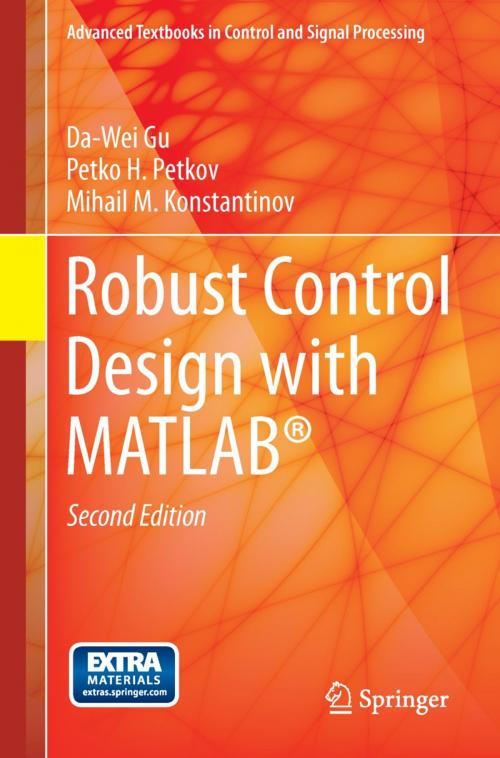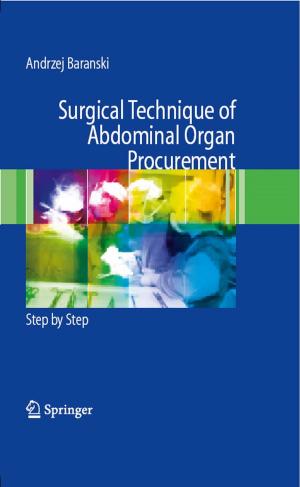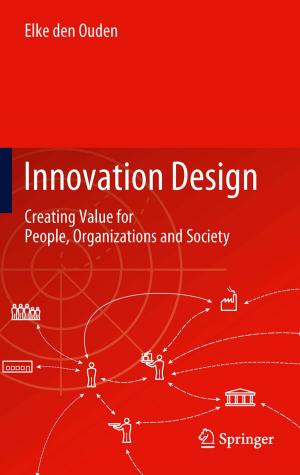Robust Control Design with MATLAB®
Nonfiction, Science & Nature, Science, Other Sciences, System Theory, Technology, Automation| Author: | Da-Wei Gu, Mihail M Konstantinov, Petko H. Petkov | ISBN: | 9781447146827 |
| Publisher: | Springer London | Publication: | July 8, 2014 |
| Imprint: | Springer | Language: | English |
| Author: | Da-Wei Gu, Mihail M Konstantinov, Petko H. Petkov |
| ISBN: | 9781447146827 |
| Publisher: | Springer London |
| Publication: | July 8, 2014 |
| Imprint: | Springer |
| Language: | English |
Robust Control Design with MATLAB® (second edition) helps the student to learn how to use well-developed advanced robust control design methods in practical cases. To this end, several realistic control design examples from teaching-laboratory experiments, such as a two-wheeled, self-balancing robot, to complex systems like a flexible-link manipulator are given detailed presentation. All of these exercises are conducted using MATLAB® Robust Control Toolbox 3, Control System Toolbox and Simulink®.
By sharing their experiences in industrial cases with minimum recourse to complicated theories and formulae, the authors convey essential ideas and useful insights into robust industrial control systems design using major H-infinity optimization and related methods allowing readers quickly to move on with their own challenges. The hands-on tutorial style of this text rests on an abundance of examples and features for the second edition:
• rewritten and simplified presentation of theoretical and methodological material including original coverage of linear matrix inequalities;
• new Part II forming a tutorial on Robust Control Toolbox 3;
• fresh design problems including the control of a two-rotor dynamic system; and
• end-of-chapter exercises.
Electronic supplements to the written text that can be downloaded from extras.springer.com/isbn include:
• M-files developed with MATLAB® help in understanding the essence of robust control system design portrayed in text-based examples;
• MDL-files for simulation of open- and closed-loop systems in Simulink®; and
• a solutions manual available free of charge to those adopting Robust Control Design with MATLAB® as a textbook for courses.
Robust Control Design with MATLAB® is for graduate students and practising engineers who want to learn how to deal with robust control design problems without spending a lot of time in researching complex theoretical developments.
Robust Control Design with MATLAB® (second edition) helps the student to learn how to use well-developed advanced robust control design methods in practical cases. To this end, several realistic control design examples from teaching-laboratory experiments, such as a two-wheeled, self-balancing robot, to complex systems like a flexible-link manipulator are given detailed presentation. All of these exercises are conducted using MATLAB® Robust Control Toolbox 3, Control System Toolbox and Simulink®.
By sharing their experiences in industrial cases with minimum recourse to complicated theories and formulae, the authors convey essential ideas and useful insights into robust industrial control systems design using major H-infinity optimization and related methods allowing readers quickly to move on with their own challenges. The hands-on tutorial style of this text rests on an abundance of examples and features for the second edition:
• rewritten and simplified presentation of theoretical and methodological material including original coverage of linear matrix inequalities;
• new Part II forming a tutorial on Robust Control Toolbox 3;
• fresh design problems including the control of a two-rotor dynamic system; and
• end-of-chapter exercises.
Electronic supplements to the written text that can be downloaded from extras.springer.com/isbn include:
• M-files developed with MATLAB® help in understanding the essence of robust control system design portrayed in text-based examples;
• MDL-files for simulation of open- and closed-loop systems in Simulink®; and
• a solutions manual available free of charge to those adopting Robust Control Design with MATLAB® as a textbook for courses.
Robust Control Design with MATLAB® is for graduate students and practising engineers who want to learn how to deal with robust control design problems without spending a lot of time in researching complex theoretical developments.















